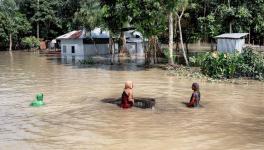Adani Power: Land Grab in Jharkhand to Supply Power to Bangladesh

Image Coutesy: Financial Express
Vast areas of agricultural land, which has been cultivated by generations of villagers, is being “acquired” for a power project through a dubious nexus between Adani Power Limited and the Government of Jharkhand. A report by Scroll.in shows how laws have been twisted, legally mandated procedures have been ignored or subverted, and villagers have been forced out of their land.
This process has come as a result of the project by Adani Power Ltd. to generate power in Jharkhand and supply it to Bangladesh. According to the project’s social impact assessment report, 1,214 acres of land is required for setting up the thermal power plant. A further 74 acres of land is required to build a 10 km long private railway line to bring the coal to the plant. All the land that is required either belong to the villagers or is common land, which is under cultivation by landless villagers or are used for grazing and other purposes. This process will affect 10 villages of which three are predominantly populated by Santhal tribals.
If Adani Power were to acquire the land on their own, they would require the consent of each of the individual landowners. This is exactly where the role of the government as cronies for the company comes to the fore. The Right to Fair Compensation and Transparency in Land Acquisition, Rehabilitation and Resettlement Act, 2013, allows the government to acquire land for a private company only if it is deemed that the project for which land is being acquired has a “public purpose”. Even after categorising a project as having “public purpose”, the consent of 80 per cent of landowners is required.
So what have the government and Adani done? They have used all their powers to subvert the provisions within the law and rights given to the people to have the project declared as having a “public purpose”. They have claimed that they have received consent of 80 per cent of the land owners. A plant which will be supplying power solely to Bangladesh has been categorised as having “public purpose” for the state of Jharkhand and the peoples of Godda district.
The advocate general declared the project as being for “public purpose” based on section 2.1 (b) of the 2013 land acquisition law. This section allows governments to acquire land for projects listed in industrial sectors in a notification issued by the Finance Ministry; electricity generation, transmission and distribution are listed in the “Harmonised Master List of Infrastructure sub-sectors”.
The process of categorising a project as having “public purpose” requires a social impact assessment which involves consulting local people to assess the costs and benefits of the project. This process was carried out on December 6, 2016 in the Khadi Bhavan of Motiya village and in a high school in Buxara village. However, the villagers were allowed to enter these meetings only as per the company’s will. The villagers who were against this land acquisition were denied entry to these meetings.
After some dissenting villagers managed to sneak into the meetings, the mikes were snatched away from them while they were voicing their dissent. Later, the villagers allege, more than 2,000 police personnel, who were present at the spot, broke into a lathicharge, fired teargas shells and even entered the homes of villagers, and assaulted them.
The other major legal issue is that of the Santhal tribals. The Santhal Paraganas Tenancy act, passed by the British in 1876 and retained by Independent India prohibits the transfer of farmland in the area, barring some exceptions – such as when the land is acquired for the railways or the government under the 1894 land acquisition law. However, this law has also been subverted, with the advocate general saying: “I am of the considered opinion that the said SPT Act does not restrict the acquisition of land for any public purpose, either for the government or for the company, except under Section 69 of the said SPT Act”. The same section 69 bans acquisition of certain lands including grazing lands and burial groves; it is bizarre to imagine villages without such lands.
It is also important to note how a lot of the land has been carefully cultivated by the villagers, over long periods of time, to yield multiple crops of good quality. However, the compensation that they receive for these efforts, which took generations, is paltry, in comparison.
Further, parts of the land that is in the process of acquisition are common lands. These are often cultivated by the landless, who will now receive no compensation. Also, the common lands are used by the villagers for grazing purposes and other activities. They also form an important part of the ecosystem, containing many water bodies such as ponds and streams. The villagers allege that the company has already begun closing off these lands by putting up barbed wire fences! This description reads very much like Marx’s description of primitive accumulation in Capital.
It must also be clearly noted that this project is not in the “public interest” of either the people of Jharkhand or the people of Bangladesh. Both will be forced to pay higher than the usual prices for power. It is solely a project in the corporate interest.
What is clear is that there is a concerted effort by the BJP and their governments to help their capitalist masters carry out a wholesale loot of the country’s resources. However, the problem does not lie with a single party, but rather the economic system which, by its very nature, encourages such cronyism.
Get the latest reports & analysis with people's perspective on Protests, movements & deep analytical videos, discussions of the current affairs in your Telegram app. Subscribe to NewsClick's Telegram channel & get Real-Time updates on stories, as they get published on our website.























